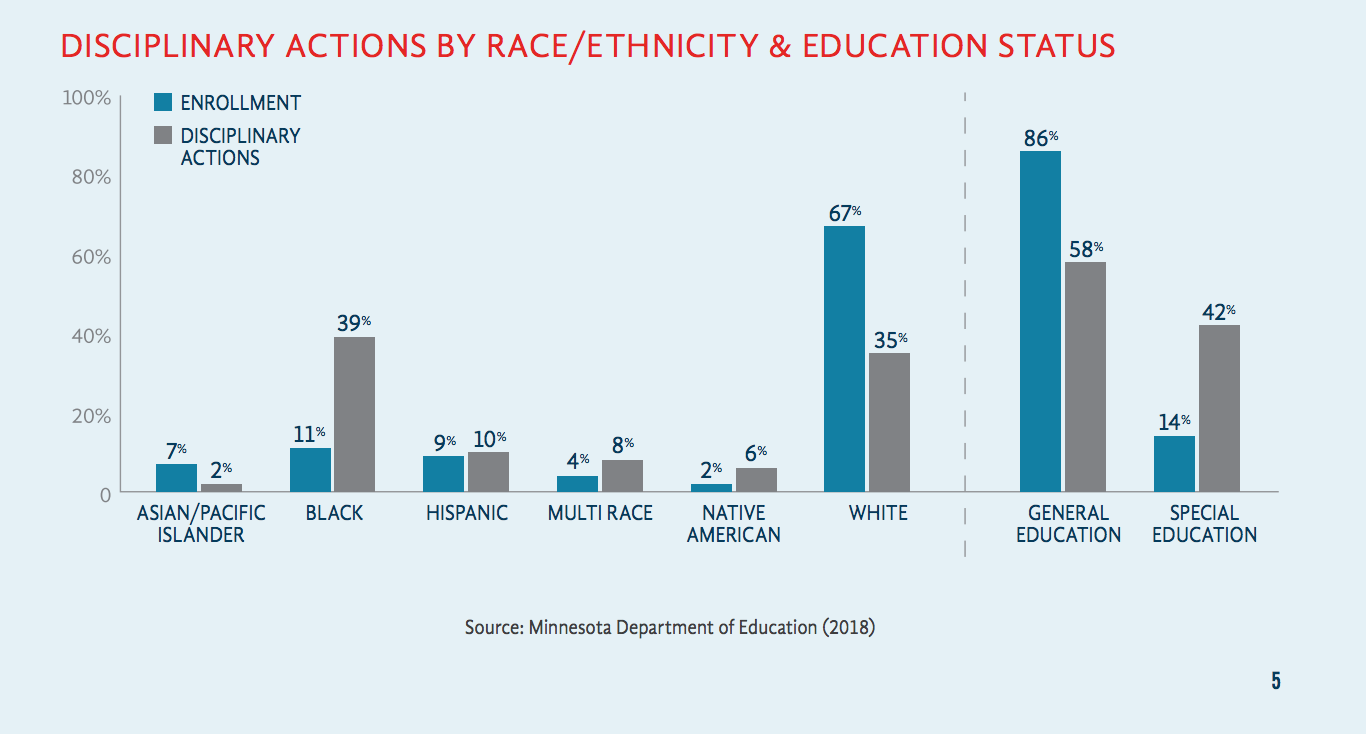
 “This White girl pulled my hair, and like, I told the principal, I was like you know what? All these teachers are being racist, and they straight up say they have their favorites. Like this one teacher says to me, 'Oh y’all Mexicans need to go back to Mexico.' I was like, no. I need to leave. So I went up to the principal. I was like, ‘This teacher’s being racist.’ He was like, ‘If you want to leave, then go ahead.’ So I left.”
4. English Learners Face Unique Challenges. English learners also experienced bias, and they said teachers and staff didn’t engage meaningfully with them to explain the reason they were being disciplined—or that they were even being disciplined in the first place. One female student spoke about a disciplinary incident that occurred shortly after she immigrated to the U.S., when she was given a week-long suspension. No one explained what it meant, so she never realized she was in trouble. Here’s what she had to say about the experience: "It was in fifth grade. I was new to America. There was this group of girls who was trying to bully me. One day, was during recess, like break time, I was going out to play and this girl behind me trying to push me, tried to grab my hair and stuff. I turned, and I slap one of the girl face, and then the teacher, they saw it. They were like, ‘Come to office with me.’ They didn't say nothing to me—‘What's wrong,’—because, you know, I don't speak English. They sent me home and say, ‘You have one week off school.’ ‘Oh cool, a day off.’ [pullquote position="left"]I didn't know I was in trouble or anything.[/pullquote]”
5. It’s Important to Consider Root Causes. Overall, many of the youth participants said they felt like the school failed to understand the root causes of the behavior that led to them being disciplined. Sometimes students were getting into fights because they were being bullied, but teachers and schools didn’t see or understand that. Sometimes they were going through a difficult time at home and needed more emotional support at school. In response to a researcher asking what teachers should have done instead of suspending or expelling him, he said this: “Just talk to me about it.”
“This White girl pulled my hair, and like, I told the principal, I was like you know what? All these teachers are being racist, and they straight up say they have their favorites. Like this one teacher says to me, 'Oh y’all Mexicans need to go back to Mexico.' I was like, no. I need to leave. So I went up to the principal. I was like, ‘This teacher’s being racist.’ He was like, ‘If you want to leave, then go ahead.’ So I left.”
4. English Learners Face Unique Challenges. English learners also experienced bias, and they said teachers and staff didn’t engage meaningfully with them to explain the reason they were being disciplined—or that they were even being disciplined in the first place. One female student spoke about a disciplinary incident that occurred shortly after she immigrated to the U.S., when she was given a week-long suspension. No one explained what it meant, so she never realized she was in trouble. Here’s what she had to say about the experience: "It was in fifth grade. I was new to America. There was this group of girls who was trying to bully me. One day, was during recess, like break time, I was going out to play and this girl behind me trying to push me, tried to grab my hair and stuff. I turned, and I slap one of the girl face, and then the teacher, they saw it. They were like, ‘Come to office with me.’ They didn't say nothing to me—‘What's wrong,’—because, you know, I don't speak English. They sent me home and say, ‘You have one week off school.’ ‘Oh cool, a day off.’ [pullquote position="left"]I didn't know I was in trouble or anything.[/pullquote]”
5. It’s Important to Consider Root Causes. Overall, many of the youth participants said they felt like the school failed to understand the root causes of the behavior that led to them being disciplined. Sometimes students were getting into fights because they were being bullied, but teachers and schools didn’t see or understand that. Sometimes they were going through a difficult time at home and needed more emotional support at school. In response to a researcher asking what teachers should have done instead of suspending or expelling him, he said this: “Just talk to me about it.”
The fight for educational equity has never been just about schools. The real North Star for this work is providing opportunities for each child to thrive into adulthood. This means that our advocacy...
Your donation will support the work we do at brightbeam to shine a light on the voices who challenge decision makers to provide the learning opportunities all children need to thrive.
Ed Post is the flagship website platform of brightbeam, a 501(c3) network of education activists and influencers demanding a better education and a brighter future for every child.
© 2020–2024 brightbeam. All rights reserved.